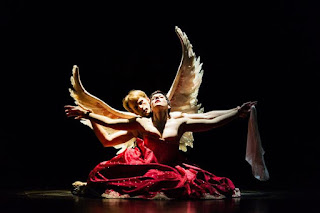WHEN THE FIRST CONFLAGRATION ERUPTED, it was a charming kerfluffle of lighting and drums. The next one was more frightening, because by that time I’d settled into more of a 17th-century sensibility and thus was more susceptible to the power of vintage theatrical magic. An audience witnessing “Armide” in its own era – it debuted in 1686 – probably got the bejabbers scared out of them when all hell – literally – broke loose in the piece.
 |
| Karli Cadel/Glimmerglass Opera |
And ballet is crucial to a piece like this in two respects. It’s part of the story-telling mechanism, able to impart emotional abstractions that play against the more straightforward music-and-words combination. And it reinforces the stylized look of Baroque acting, in which what we’d now consider exaggerated gesture is crucial to the piece.
Armide (soprano Peggy Kriha Dye), a sorceress, has been thwarted by the crusader Renaud (tenor Colin Ainsworth), whom she vows to destroy – unless her burgeoning love for him gets in the way. And the heart of the opera is her journey through these conflicting feelings, culminating at the end of Act Two, when she triumphantly declares that the enchanted Renaud is now in her power and then quickly vacillates among many shadings of passion.
Her gestures bring her arms and body to life with the fervency of a dancer, while her singing is so fine and focused that it pierces the heart. It’s a triumph for Kriha Dye.
We don’t meet Renaud until the second act, when his wanderings take him to a forest inhabited by Armide’s demons, who lull him to sleep as he sings the gorgeous “sleep aria” Plus j'observe ces lieux (“The more I study this place”). Ainsworth has a gorgeous voice and an infectious charm, so that you can believe he’ll slaughter enemy forces and then turn around and admire a tree.
But this is a production where every aspect contributes fully. The orchestra, under the direction of David Fallis, has a crisp, Baroque sound made evident by the first dotted-note rhythm in the overture, and aided by a continue section comprising harpsichordists Borys Medicky and Christopher Devlin, Michael Leopold and Richard Kolb on long-necked theorbos, Craig Trompeter playing viola da gamba and cellist Ruth Berry.
Nominally set in Damascus, the piece gets a Persian look thanks to the storybook set by Gerard Gauci, whose is able to hint at (and then deliver) menace even in a verdant bower. And the costumes, by Dora Rust D’Eye, suggest composer Lully’s own home base at Versailles, further reinforcing the sound of the opera.
When a frustrated Armide summons the power of Hatred (La Haine), bass-baritone Curtis Sullivan appears in a form-fitting costume of carbon and flame, which I want for Hallowe’en. He is dynamic enough in the role (if a little weak vocally) to make the outfit no laughing matter, and when joined by the dancers, now re-clad in a similarly oppressive mode, the theatrical experience is compelling.
There’s some unexpected comedy in the arrival of the knights Ubalde and Danois (Olivier LaQuerre and Aaron Ferguson), who arrive in Act Four in search of Renaud and are confounded by beautiful, persistent spirits. We need the relief of their charming duets at that point, and LaQuerre and Ferguson also manage the physical comedy without the usual opera-singer overdo.
Director Marshall Pynkoski is a co-founder of Opera Atelier, and does wonders with this piece to remind us why Baroque opera was such a persuasive force. “Let us devote our youth to love,” we’re advised in the opera. “Wisdom and age will come soon enough.” It doesn’t pay off for Armide or Renaud, so let wisdom and age guide you to see this production.
Armide
Music by Jean-Baptiste Lully
Libretto by Philippe Quinault
Conducted by David Fallis
Directed by Marshall Pynkoski
Glimmerglass Festival, July 31
– Metroland Magazine, 2 August 2012
No comments:
Post a Comment